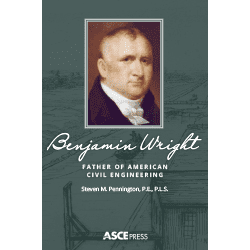New ASCE Biography on Benjamin Wright Chronicles Works of the “Father of American Civil Engineering”

Reston, Va. –The American Society of Civil Engineers (ASCE) recognizes the impact Benjamin Wright has had on the civil engineering profession in their newest publication, Benjamin Wright: Father of American Civil Engineering. Steven M. Pennington chronicles Wright’s life and varied career from country surveyor to his early work on America’s railroads.
Wright understood the mechanics and connectivity of how politics and economics demonstrated themselves. He worked with leaders across the business and engineering communities to make a lasting social, economic, and historical contribution. His career spanned from 1870 to 1840, where he surveyed the Mohawk River for navigation improvements and supervising the engineering of the Erie Canal project, contributed to such projects as the Chesapeake and Delaware Canal near Philadelphia, and the Chesapeake and Ohio Canal near Washington, DC. From the capital city, Wright advanced his engineering practice as America grew and viewed its manifest expansion to the West.
Benjamin Wright realized the importance of establishing an organization of practicing engineers to stimulate technical, business, ethical, and professional attitudes. In 1839, he participated in organizational meetings of what would become the American Society of Civil Engineers which, in 1970, designated him the “Father of American Civil Engineering.”
To purchase online, visit the ASCE Bookstore
Limited review copies are available for book reviews. Please contact Kevin Higgins, [email protected]; phone 703-295-6266.
ABOUT THE AMERICAN SOCIETY OF CIVIL ENGINEERS
Founded in 1852, the American Society of Civil Engineers represents more than 150,000 civil engineers worldwide and is America’s oldest national engineering society. ASCE works to raise awareness of the need to maintain and modernize the nation’s infrastructure using sustainable and resilient practices, advocates for increasing and optimizing investment in infrastructure, and improve engineering knowledge and competency.


